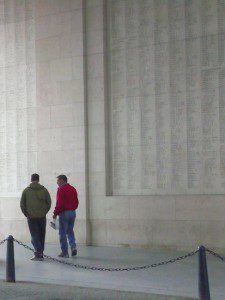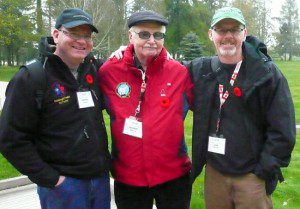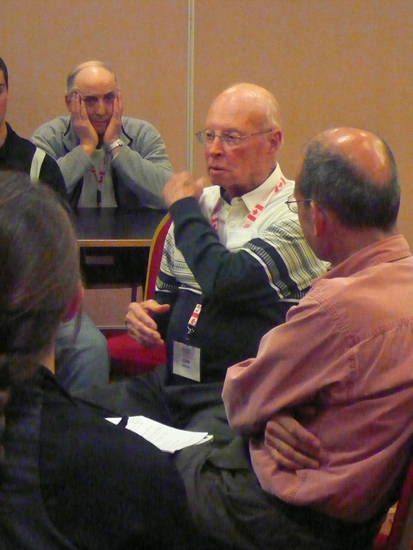
About three days into the tour, I saw the two of them walking and talking. Tony and Jeff Peck were pausing to look up at a wall of inscriptions. There in front of them the names of some 54,896 Commonwealth soldiers, for whom there are no known remains, lay chiselled in the stone. They are the so-called “missing” from the Great War. A couple of days later, father Tony watched son Jeff participate in the famous Last Post Ceremony under the same barrel-vaulted archway known as the Menin Gate.
“They shall grow not old, as we who are left grow old,” Jeff recited to the hundreds watching in silence. “Age shall not weary them, nor the years condemn. At the going down of the sun and in the morning, we will remember them.”
Every evening at 8 o’clock, the fire department of Ypres, Belgium, arrives at either end of this massive Menin Gate Memorial, stops the traffic and allows veterans, citizens and hundreds of tourists to watch this famous, presentation. In addition to the recital of this famous poem “For the Fallen” by a designated veteran, buglers from the town fire brigade play the Last Post and Reveille.
Except for the period of German occupation (during the Second World War) the citizens of Ypres have repeated this nightly ritual uninterrupted since 1928. For Jeff Peck, a veteran of the War in Afghanistan, reciting the Laurence Binyon poem, he said, was a distinct honour.
Equally distinctive, following the ceremony, Uxbridge’s recently retired fire chief, Tony Peck, presented crests and pins displaying the emblems from our local firefighters to the fire brigade buglers of Ypres.
“I felt very proud,” Tony Peck said later. “Quite an evening.”
Just back from a tour of First World War battlefield sites and Commonwealth War Graves Commission cemeteries in northern France and Belgium as well as a side trip to Dieppe and the D-Day beaches of Normandy, I’ve been reflecting on some of the memorable times shared by the 55 adults and 18 students and three teachers who travelled with me. There are many indelible moments. Remarkably, many of them resulted from six sets of fathers and sons travelling in my tour group, among them Tony and Jeff Peck.

Also during the tour, 80-year-old George Bracken (from Kingston) and his two sons – George Jr. (from Lombardy, Ont.) and Robert (from North Vancouver) paid tribute to Bill Bracken, George Sr.’s brother. Lt.-Col. William Bracken had flown photo reconnaissance Spitfires in Europe, Burma and North Africa. One day following the summer of 1942, the Brackens recalled, pilot Bill Bracken and a fellow pilot were driving across a recently seized battlefield near El Alamein, in North Africa.
“At one point they stopped and began firing abandoned weapons as a lark,” George Bracken recalled. “Suddenly, two German soldiers came out of hiding and surrendered to my brother Bill… It was one of the few instances when RAF pilots actually captured German ground troops.”

Then there was the night, during our tour, I interviewed another veteran travelling with us, in front of the rest of the group. At 86, John Moroney has never considered his work in an aircraft manufacturing plant in Montreal as wartime service. Nevertheless, as a teenager, he worked on an assembly line building the under-carriage sections of Hurricane fighter aircraft. But Moroney’s supervisor had a very specific job for John in mind.
“My boss put me on the assembly line right between these two older men,” Moroney said. “I soon discovered that I was put between an Irish Catholic and an Irish Protestant. And my job was to keep them from fighting with each other.”
Then John Moroney recalled his overseas service with the Black Watch helping to restore law and order in the streets of occupied Germany in late 1945. On the final night of our trip through First and Second World War sites, we gathered for a Farewell Dinner in Caen, France. I asked John Moroney’s son Jim how the trip had affected his father.
“He’s never had so much fun,” Jim Moroney said. “I think it’s added years to his life.”
Also during the evening’s final send-off, veteran Jeff Peck rose to offer a toast to soldiers past and present. He explained that during one stop at the Juno Beach Centre, where Canadians had launched the D-Day invasion in Normandy, he’d found a commemorative plaque honouring the four members of his Princess Patricia’s Canadian Light Infantry killed in the so-called friendly fire incident in Afghanistan. Peck witnessed their deaths in April 2002. At that point in his toast, he found it difficult to continue.
I looked to his father seated nearby and Tony Peck was teary-eyed too. “It’s been an incredible trip,” he told me later. This overseas journey had been a gift from son to father in honour of Tony’s retirement from the Uxbridge firefighting force.
Given how much the fathers and sons had shared on this trip, I suspect the gift was a two-way affair.